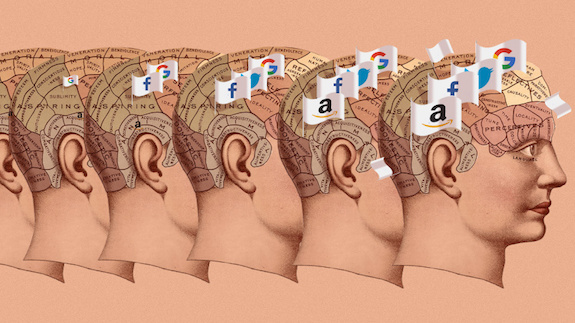
Here’s the real danger that Facebook, Google and the other tech monopolies pose to our society
Most people fear and loathe monopolies because they dominate their categories or markets and squeeze out competition. But that’s just the tip of the iceberg of the threat they hold, warns technology analyst Jamie Bartlett.
The threat that tech monopolies pose to democracies is about more than the prices they charge: it’s the concentration of power, data and control over the public space — and their ability to wield this power over a growing number of economic activities, especially in the infrastructure and technologies of the future. The following companies operate as either monopolies or oligopolies in their respective fields: Google, Facebook, Uber, Airbnb, Amazon, Twitter, Instagram, Spotify. Integrated into everything, everywhere, their technology will blanket the world.
Perhaps the final stage in the rise of monopolies is when their economic power morphs into what Marxists sometimes call “cultural hegemony.” That is, where domination can be achieved through controlling the ideas and assumptions available to the public. The idea, associated with philosopher and politician Antonio Gramsci and his criticism of capitalism, is worth considering because there’s little doubt that a techno-utopian view of the world has infected society.
Tech is just the latest vehicle for very rich people to use well-tested techniques of buying political influence, monopolistic behavior and avoiding regulation.
All technology encodes within it certain values and assumptions about how the world works. Gutenberg’s press was more than a mere printing machine — it popularized the ideal of free information exchange. The telegraph system transformed people’s perceptions of time and distance, while the radio helped invent the concept of a single shared nationality, culture and language. The medium, remember, is the message. And the medium of digital technology, as a sector, is now monopolizing the whole economy.
In 1995, left-wing academics Richard Barbrook and Andy Cameron detailed the philosophy and ideas of the new tech wunderkinds, christening it “The Californian Ideology.” This ideology represented a fusion of the cultural bohemianism of San Francisco and entrepreneurial free market zeal. Barbrook and Cameron thought it was appealing because it offered a way out of the traditional political struggles over wealth distribution or fairness. A profound faith in the emancipatory qualities of technology allowed the techies to paper over any inconsistencies, because they promised that when the revolution arrived everyone would be great and cool and fulfilled and rich. All you needed to get to utopia was a belief in “disruption,” the idea that progress is achieved through smashing up old industries and institutions and replacing them with something new and digital.
This is the secret behind the digital revolution. The reason that startups flock to Silicon Valley is not just the promise of building a better world — it’s because that’s where the venture capital is. Money and ideas in Silicon Valley have a very complicated relationship. Even start-up visionaries and wide-eyed socially-minded inventors need money to survive, to pay extortionate Bay Area rent and to hire the best programmers. Silicon Valley runs according to a Faustian pact: money in exchange for world-changing ideas. But investment brings with it new responsibilities, and suddenly there are profit margins, quarterlies and growth targets. In some ways, tech is just the latest vehicle for very rich people to use well-tested techniques of buying political influence, monopolistic behavior and regulation avoidance, to help them become even richer. Doing it through tech allows them to add a glossy veneer of progress on top of some very familiar behavior.
The iPhone and web browsers have infected us all with the alluring idea that disruption is liberation, total individualism is empowerment and gadgets equal progress.
Over the years, the big tech firms have very carefully cultivated the Californian Ideology. Even though they are massive multi-billion-dollar corporations with huge PR teams, they pitch themselves as anti-establishment; even though they are built on a model of data extraction and surveillance capitalism, they purport to be promoting exciting and liberating technology; even though they are dominated by rich white guys, they talk of social justice and equality. I sometimes think it must be very confusing to be Mark Zuckerberg. In 2014, only 2 percent of Facebook staff were black and less than a third were women. They were also caught providing inaccurate information about user data matching to the European Commission during their acquisition of WhatsApp. And yet, later that year, Zuckerberg said that “our philosophy is that we care about people first.” The worse these companies behave and the richer they become, the more they spend on looking cool and talking about fairness and community. This cannot be a coincidence.
Wealthy corporations cultivate the popular ideas of the day not just by direct pressure, but also by funnelling money towards individuals and ideas that see the world as they do. And through their funding of think tanks and, increasingly, academia, the public imagination about technology is rebalanced in a subtle but definite way; the pervasive influence of Google is one significant example. But it’s much more than that. The iPhone and web browsers we use have carried the Californian Ideology around the world, infecting us all with the alluring idea that disruption is liberation, total individualism is empowerment and gadgets equal progress.
Sometimes these things are true, though they are hardly iron laws of social change. But believing it means the tech firms march off into the future and then come back and hand us a map to guide us through it. It is hard to imagine the coming years without schools full of iPads (Apple), VR headsets (the Facebook-owned Oculus) and coding classes (run by Google).
One UK MP suggested running the National Health Service like Uber, while another pitched the idea of Airbnb-style room rentals for overnight patients. Heaven help us all.
Research from the NSPCC found that almost half of all children want to pursue a career in tech. An even more depressing statistic is that 30 percent hope to become the one-in-a-million YouTuber who actually makes a career of it. Every country wants to build their own Silicon Valley, and every city has ambitions to be a tech hub. Read any political manifesto from across the spectrum, and you’ll find yourself lost in a world of smart cities, lean governments and flexible workers.
And to whom do we look in order to solve our collective social problems? It’s no longer the state, but the modern tech-geek superhero. Space travel and climate change has fallen to Elon Musk. We look to Google to solve health problems and sort out ageing. Facebook gets to decide what free speech is and battle against fake news, while Amazon’s Jeff Bezos saves the Washington Post from bankruptcy and funds scholarships. One UK MP suggested we might run the National Health Service like Uber, while another pitched the idea of Airbnb-style room rentals for patients who needed to stay overnight. Heaven help us all.
Total victory for the monopoly is not over economics or politics. It’s over assumptions, ideas and possible futures. Because when that happens, Big Tech won’t need to lobby or buy out competitors. They will have so insinuated themselves in our lives and minds, that we won’t be able to imagine a world without them.
Excerpted from the new book The People vs. Tech: How the Internet is Killing Democracy (and How We Can Save It) by Jamie Bartlett. Published by Dutton, an imprint and division of Penguin Random House LLC, New York. Copyright © 2018 by Jamie Bartlett.
ABOUT THE AUTHOR
Jamie Bartlett is the bestselling author of “The Dark Net” and “Radicals Chasing Utopia: Inside the Rogue Movements Trying to Change the World.” He is the Director of the Centre for the Analysis of Social Media at the thinktank Demos. He also writes on technology for the Spectator, the Telegraph and other publications. This piece was adapted for TED-Ed from this Ideas article.
Art Credit: Nicholas Ortega





